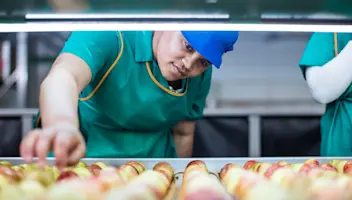10 Ways to Effectively Track & Control Inventory Across Your Organization
10 Ways to Effectively Track & Control Inventory Across Your Organization
10 Ways to Effectively Track & Control Inventory Across Your Organization
16 Mars 2020
Aptean Staff Writer
Having clear visibility into your company’s inventory at any given moment is essential to its overall success. Some of the industry’s biggest losses stem from faulty inventory management procedures. For food manufacturers, the loss of raw ingredients is the second-highest cost to companies (at 25%) outside of labor. Manufacturers must ensure they’re investing the necessary time, staff, expertise and resources into proper inventory tracking and control to ensure success and take their businesses to the next level.
An enterprise resource planning (ERP) system built for the food industry helps take the guesswork out of inventory management by giving you real-time control over the following:
1. Batch and Expiration Tracking
Being able to track product as it moves throughout your warehouse is integral when you’re dealing with perishable goods. With the help of an ERP, it’s much easier to determine which products came in first so that you can sell the older stock before the newer batches to avoid inventory spoilage.
An ERP solution with a built-in first-expiry, first-out (FEFO) date management functionality allows you to more efficiently track and manage products, helping to ensure that nothing sits on your shelves for too long. A system built for the food industry tracks expiration and lot information to indicate which items should be rotated out of inventory first.
2. Seasonal Demand
During seasons of peak demand, one of the more substantial challenges is securing enough supply to meet customer expectations. Because so much of your business’ success relies on meeting customer demand during this short timeframe, you must have the inventory, staff and equipment needed to keep up with production and to ensure resources are used effectively and efficiently.
Running out of a key ingredient during peak season, for example, could halt production and result in a devastating loss for your company. Having up-to-date insight into inventory levels and a system that flags shortages and automates reordering guarantees you always have enough product in stock.
3. Inventory Management
Your manufacturing facility is a busy place: between shift changes, shipments being received and shipped out, new order picking and quality checking, the shop floor can become chaotic if it’s not properly managed. Without a way to track inventory as it moves into, out of and throughout your facility, there’s room for materials to be misplaced, mislabeled or used incorrectly. This inevitably leads to wasted product and wasted money.
Barcode scanning, lot tracking functionality and bin management tools native to a food-specific ERP ensures inventory reporting is always done efficiently and accurately.
4. Compliance With Government Regulations
To meet the stringent industry and government regulations placed on food and beverage manufacturers and distributors, an ERP can prove a necessity in terms of remaining compliant. Not only are regulations and demands constantly changing, but being compliant helps to ensure that your company is safe from costly recalls and legal fallouts. Bi-directional ingredient and product traceability, allergen management and inventory entry compliance tools ensure that your company meets safety standards.
5. Product Traceability
While food manufacturers are certainly not strangers to the risks associated with food handling and food safety, a report conducted by the U.S. Public Interest Research Group Education Fund found that between 2013 and 2017 overall food recalls increased by 10%. This means that it’s never been more important to ensure your company is recall-ready.
Having the ability to track an ingredient backward and forwards throughout the production line, perform quality audits and checks (from pre-receipt to entry-to-exit) and isolate defective products can seem impossible without the help of a solution built for the food industry.
6. Catch Weight Management
When an item’s weight varies (think a case of meat), it is referred to as “catchweight”. Because these products tend to vary in size, knowing the approximate weight of the product is crucial. Cheese and cuts of meat, for example, are generally sold by block or case but tend to be priced by the pound. If a lot of meat is packaged into ten different cases, each unit could sell for a different price because of its unique weight.
An industry-specific ERP should record two units of measure: inventory unit and catch weight unit. This makes it possible to capture the exact weights of your varied-weighted items, sell and process them according to a physical unit, and price and cost them according to their weight.
7. Packaging Optimization
Any food manufacturer knows how important the proper packaging of a product is. From having the proper seal to ensuring a product is packaged and stored at the right temperature, having safe and efficient packaging processes in place ensures that the product you worked so hard to create is ready to hit store shelves.
But making sure your product is packaged properly isn’t always easy. Labeling requirements, barrier materials and food safety are all paramount and can be better managed with an ERP designed for the food industry. Not only does an all-in-one system work to optimize these packaging requirements, but it also helps ensure the right inventory is placed in the right packaging at the right time.
8. Food Waste Reduction
Simply put, food that’s wasted is equivalent to a sales opportunity that’s wasted. It directly affects your bottom line. If you can find small ways to prevent food waste, the better off your bottom line will be, and the more closely a facility monitors its waste, the more informed managers can be about making smart decisions regarding efficient facility processes. Did you know, approximately 133 billion pounds of (31%) of the U.S.’s food supply is wasted every year? Food waste remains the most difficult challenge the industry faces.
An ERP can help track and minimize the amount of food or ingredients your company wastes. By optimizing your supply chain and ensuring that your products are correctly labeled, packaged and shipped as quickly as possible, you can help mitigate waste, become more sustainable and boost your bottom line.
9. Master Production Scheduling (MPS) and Material Requirements Planning (MRP)
An ERP with MPS & MRP functionality built-in makes it that much easier to manage inventory, purchasing and manufacturing. Using the data that’s tied to the ERP solution, planning tools can help you create more accurate orders to eliminate waste, enable you to enhance demand planning and forecasting, and create an anticipated production schedule based on current supply, forecast demand and scheduled employees. An ERP that has fully integrated MPS and MRP functionality means you don’t need add-ons or disparate systems; all your data is in one centralized location.
10. Cost Reduction
While the up-front cost of an ERP may scare some food manufacturers, leaders must trust that savings will inevitably come. By improving inventory management, you’re putting accuracy at the forefront of your operations. In reducing waste, properly managing your inventory, protecting yourself against costly recalls, and streamlining your entire production process, you’re paving the way for success. With accuracy and control of your inventory at the helm, the rest of your business’ operations will inevitably follow suit. It then becomes easy to see the ROI of an ERP built for the food industry.
Want to learn more about how our food and beverage software solution, Aptean Food & Beverage ERP, can help you effectively track and control inventory across your organization? Reach out to us, we’d love to talk.
Food Insights


Prêt à transformer votre entreprise ?
Nous avons les solutions ERP spécialisées dont vous avez besoin pour relever les défis de votre secteur.






